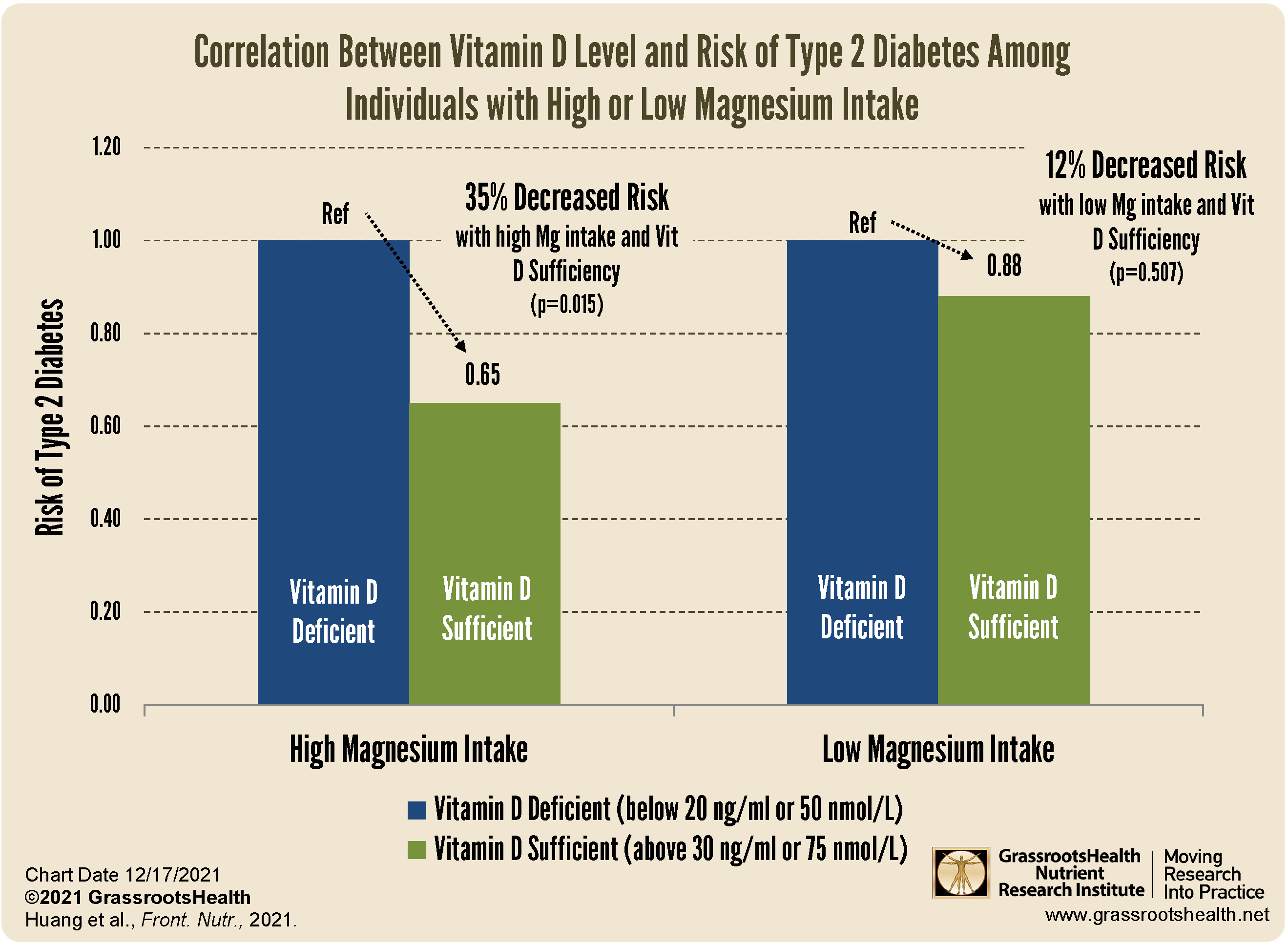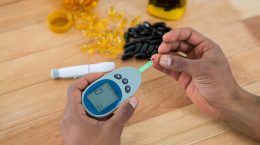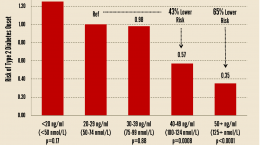Published on August 2, 2019
Getting enough magnesium can make a difference in how vitamin D affects certain health outcomes
Key Points
- Magnesium is an important co-nutrient for vitamin D, and is needed to help vitamin D carry out many of its functions
- Studies have shown that getting more vitamin D can reduce the risk and progression of type 2 diabetes
- A recent study found that higher vitamin D levels were significantly associated with a decreased incidence of type 2 diabetes only among those with a higher intake of magnesium, and the effect was greater among those who got more magnesium
 Magnesium is the fourth most abundant mineral in the human body, however, an estimated 42% of young adults have ongoing magnesium deficiency. This can lead to problems with energy metabolism, muscle function, blood pressure regulation, insulin metabolism, cardiovascular function, nerve transmission, neuromuscular contraction, and more.
Magnesium is the fourth most abundant mineral in the human body, however, an estimated 42% of young adults have ongoing magnesium deficiency. This can lead to problems with energy metabolism, muscle function, blood pressure regulation, insulin metabolism, cardiovascular function, nerve transmission, neuromuscular contraction, and more.
Magnesium is also an important co-nutrient for vitamin D, and is involved in the biosynthesis, transport, and activation of vitamin D. Studies have shown that poor magnesium status potentially impairs vitamin D metabolism enough to limit the parathyroid hormone (PTH) response, which increases the activation of vitamin D to then increase calcium absorption. Also, an existing magnesium deficiency may result in a vitamin D level that does not increase as much as expected in response to vitamin D supplementation. As illustrated by Deng et al., without sufficient magnesium, the amount of vitamin D that can be metabolized and used by the body is limited and may result in a lack of conversion of vitamin D into its other active forms.
Could Not Getting Enough Magnesium Modify Vitamin D’s Effect on Disease Outcomes?
One disease that vitamin D has been associated with is type 2 diabetes. Several studies have shown a decrease in type 2 diabetes incidence and progression among those who either supplement with vitamin D or who have higher vitamin D levels.
To see if magnesium intake affected the relationship between vitamin D and type 2 diabetes risk, Huang et al. completed a study that looked at whether the effect of vitamin D on the risk of type 2 diabetes differed based on a low versus a high magnesium intake. Data on 10,249 participants from the 2007-2014 National Health and Nutrition Examination Survey (NHANES) was used and categorized based on the magnesium intake of participants. A magnesium intake of less than 267 mg/day was considered low intake, and 267 mg/day or higher was considered high magnesium intake.
Vitamin D levels were grouped as deficient (below 20 ng/ml or 50 nmol/L), suboptimal (20-30 ng/ml or 50-75 nmol/L), and sufficient (greater than 30 ng/ml or 75 nmol/L).
What did the study find?
The authors found that magnesium intake affected the association between vitamin D level and the incidence of type 2 diabetes, where the distribution of vitamin D levels between participants with or without type 2 diabetes was not significantly different in the low magnesium intake group, but was in the high magnesium intake group.
In the group with high magnesium intake, there was a 35% significantly decreased risk of type 2 diabetes among the participants with vitamin D sufficiency compared to those with vitamin D deficiency, compared to the group with low magnesium intake, which only had a 12% decreased risk among those with vitamin D sufficiency, and the finding was not significant.
In other words, higher vitamin D levels were associated with a decreased incidence of type 2 diabetes, and the significance of the effect was greater among those who got more magnesium.
Make Sure Both Your Vitamin D AND Magnesium Levels Are Good!
 Having and maintaining healthy vitamin D, magnesium, and other nutrient levels can help improve your health now and for your future. Choose which to measure, such as your vitamin D, omega-3s, and essential minerals including magnesium and zinc, by creating your custom home test kit today. Take steps to improve the status of each of these measurements to benefit your overall health. You can also track your own intakes, symptoms and results to see what works best for YOU.
Having and maintaining healthy vitamin D, magnesium, and other nutrient levels can help improve your health now and for your future. Choose which to measure, such as your vitamin D, omega-3s, and essential minerals including magnesium and zinc, by creating your custom home test kit today. Take steps to improve the status of each of these measurements to benefit your overall health. You can also track your own intakes, symptoms and results to see what works best for YOU.
Enroll and test your levels today, learn what steps to take to improve your status of vitamin D (see below) and other nutrients and blood markers, and take action! By enrolling in the GrassrootsHealth projects, you are not only contributing valuable information to everyone, you are also gaining knowledge about how you could improve your own health through measuring and tracking your nutrient status, and educating yourself on how to improve it.






